What is acute coronary syndrome (ACS)?
ACS is sudden decreased blood flow to your heart. This causes a lack of oxygen to your heart and can lead to unstable angina or a heart attack.
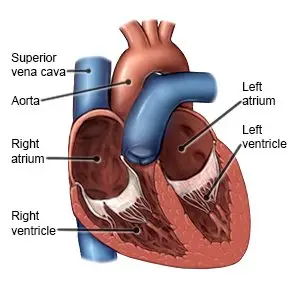 |
What causes ACS?
ACS is caused by narrowing of the blood vessels that carry blood and oxygen to the heart muscle. Unstable angina occurs when part of the artery is blocked, or a clot gets stuck and then breaks free. A heart attack occurs when the narrowed artery becomes totally blocked, usually by a blood clot or plaque.
What increases my risk for ACS?
- A family history of coronary artery disease
- Certain medical conditions, such as kidney disease, high blood pressure, or diabetes
- Being a woman older than 40 or a man older than 33
- Obesity, smoking, or lack of physical activity
What are the signs and symptoms of ACS?
- Chest pain or discomfort, including squeezing, crushing, pressure, tightness, or heaviness
- Pain or discomfort in your arms, shoulders, neck, back, or jaw
- Heartburn, nausea, or vomiting
- Abdominal pain
- Shortness of breath
- Sweating, weakness, or fainting
How is ACS diagnosed?
Your healthcare provider will examine you and ask about your symptoms. Tell him or her if you have any medical conditions and if you have a family history of heart disease. He or she may also ask about medicines you take. Any of the following may be used to diagnose ACS:
- An EKG records the electrical activity of your heart. It is used to check for abnormal heart rhythm. You may need more than 1 EKG.
- Blood tests may show signs of damage to your heart muscle. These tests will be done more than 1 time.
- An echocardiogram (echo) is a type of ultrasound that shows the size and shape of your heart. An echo also checks how your heart moves when it is beating. An echo can show fluid around your heart or problems with your heart valves.
- A cardiac catheterization is a procedure to check for blockage in your arteries. A tube is threaded to your heart through a blood vessel in your leg or arm. Contrast liquid is injected through the tube to help healthcare providers see the pictures better. Tell the healthcare provider if you have ever had an allergic reaction to contrast liquid.
- A stress test helps healthcare providers see the changes that take place in your heart while it is under stress. Healthcare providers may place stress on your heart with exercise or medicine.
Which medicines may be used to treat ACS?
- ACE inhibitors and beta-blockers keep your blood vessels open and help your heart pump strongly and regularly.
- Cholesterol medicine helps lower the amount of plaque buildup in your arteries.
- Blood pressure medicine helps decrease the strain on your heart.
- Pain medicine helps decrease your pain and slows your heart rate.
- Blood thinners help prevent blood clots. Clots can cause strokes, heart attacks, and death. Many types of blood thinners are available. Your healthcare provider will give you specific instructions for the type you are given. The following are general safety guidelines to follow while you are taking a blood thinner:
- Watch for bleeding and bruising. Watch for bleeding from your gums or nose. Watch for blood in your urine and bowel movements. Use a soft washcloth on your skin, and a soft toothbrush to brush your teeth. This can keep your skin and gums from bleeding. If you shave, use an electric shaver. Do not play contact sports.
- Tell your dentist and other healthcare providers that you take a blood thinner. Wear a bracelet or necklace that says you take this medicine.
- Do not start or stop any other medicines or supplements unless your healthcare provider tells you to. Many medicines and supplements cannot be used with blood thinners.
- Take your blood thinner exactly as prescribed by your healthcare provider. Do not skip does or take less than prescribed. Tell your provider right away if you forget to take your blood thinner, or if you take too much.
- Antiplatelets , such as aspirin, help prevent blood clots. Take your antiplatelet medicine exactly as directed. These medicines make it more likely for you to bleed or bruise. If you are told to take aspirin, do not take acetaminophen or ibuprofen instead.
- Thrombolytics help break apart and dissolve clots.
- Nitroglycerin opens the arteries to your heart so the heart gets more oxygen. It is given as a pill, IV, or topical patch or paste.
What are some other treatments for ACS?
In addition to medicines, your healthcare provider or she may recommend a procedure or surgery. He or she can explain the benefits and risks of each treatment. The following are commonly used to treat ACS:
- An angioplasty is a procedure to open an artery blocked by plaque. A tube with a balloon on the end is threaded into the blocked artery. The balloon is filled with liquid, which presses the plaque against the artery wall. This opens the artery so blood can flow through it.
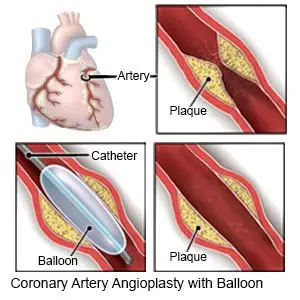
- Coronary intravascular stent placement is usually done during an angioplasty. A stent is a hollow tube made of wire mesh that is put into a coronary artery. The stent supports the artery and keeps it open so blood can flow through it.
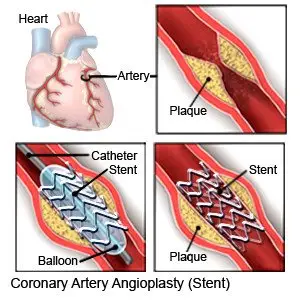
- Coronary artery bypass graft surgery (CABG) is open-heart surgery. A graft is used from another artery in your body to replace the blocked artery.
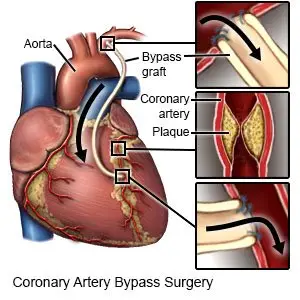
- Cardiac rehab is a program that teaches you how to live a more heart-healthy lifestyle, including nutrition and exercise.
Treatment options
The following list of medications are in some way related to or used in the treatment of this condition.
- Plavix
- Effient
- Brilinta
- clopidogrel
- Lovenox
View more treatment options
What can I do to help manage or prevent ACS?
ACS cannot always be prevented. The following can help you manage ACS and may help prevent it if you have certain risk factors:
- Eat heart-healthy foods. Include fresh fruits and vegetables in your meal plan. Choose low-fat foods, such as skim or 1% fat milk, low-fat cheese and yogurt, fish, chicken (without skin), and lean meats. Eat two 4-ounce servings of fish high in omega-3 fats each week, such as salmon, fresh tuna, and herring.

- Limit sodium (salt) as directed. Avoid foods that are high in sodium, such as canned foods, potato chips, salty snacks, and cold cuts. If you add salt when you cook, do not add more salt at the table.
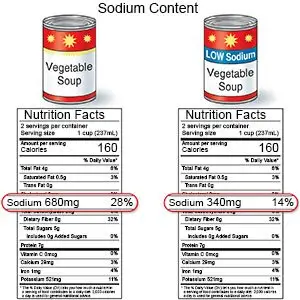
- Ask about activity. Your healthcare provider will tell you which activities to limit or avoid. Ask when you can drive, return to work, and have sex. Ask about the best physical activity plan for you.
- Maintain a healthy weight. Ask your healthcare provider what a healthy weight is for you. Ask him or her to help you create a safe weight loss plan, if needed.
- Do not smoke. Nicotine and other chemicals in cigarettes and cigars can cause heart and lung damage. Ask your healthcare provider for information if you currently smoke and need help to quit. E-cigarettes or smokeless tobacco still contain nicotine. Talk to your healthcare provider before you use these products.
- Ask about vaccines you may need. Your healthcare provider can tell you which vaccines you need, and when to get them. The following vaccines help prevent certain diseases that can put more stress on your heart:
- The influenza (flu) vaccine is given each year. Get a flu vaccine as soon as recommended, usually in September or October.
- The pneumonia vaccine is usually given every 5 years. Your healthcare provider may recommend the pneumonia vaccine if you are 65 or older.
- COVID-19 vaccines are given to adults as a shot in 1 or 2 doses. Vaccination is recommended for all adults. A booster (additional) dose is also recommended for all adults. A second booster is recommended for all adults 50 or older and for immunocompromised adults 18 or older. The second booster is also recommended for adults who received the 1-dose vaccine for the first and booster doses. Your healthcare provider can tell you when to get one or both boosters.
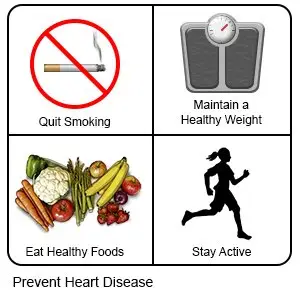 |
Call your local emergency number (911 in the US) for any of the following:
- You have any of the following signs of a heart attack:
- Squeezing, pressure, or pain in your chest
- You may also have any of the following:
- Discomfort or pain in your back, neck, jaw, stomach, or arm
- Shortness of breath
- Nausea or vomiting
- Lightheadedness or a sudden cold sweat
- You have any of the following signs of a stroke:
- Numbness or drooping on one side of your face
- Weakness in an arm or leg
- Confusion or difficulty speaking
- Dizziness, a severe headache, or vision loss
When should I call my doctor?
- You have questions or concerns about your condition or care.
Care Agreement
You have the right to help plan your care. Learn about your health condition and how it may be treated. Discuss treatment options with your healthcare providers to decide what care you want to receive. You always have the right to refuse treatment. The above information is an educational aid only. It is not intended as medical advice for individual conditions or treatments. Talk to your doctor, nurse or pharmacist before following any medical regimen to see if it is safe and effective for you.© Copyright Merative 2023 Information is for End User's use only and may not be sold, redistributed or otherwise used for commercial purposes.




